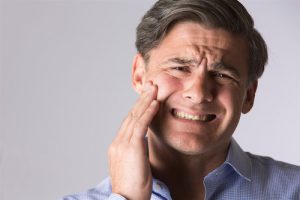TMJ and Whole Health Dentistry

Sellwood-Moreland and Portland OR
Temporomandibular Joint and muscle disorders—frequently shortened to TMJ—refer to inflammation and tightness of the temporal-mandibular joint that connects the jaw to the skull.
Specifically, TMJ disorder means that stress and strain is occurring in the jaw joints.
The temporomandibular jaw joint is very complex as a prominent nerve, known as the trigeminal nerve, runs through the joint from the brain, and into the lower jaw. When the joint is irritated and inflamed, this nerve sends pain signals to the brain, which results in headaches or migraines. Many TMJ sufferers find that their TMJ pain becomes debilitating, and interferes with their lives.
How does TMJ develop?
TMJ is caused by a variety of issues including:
- Bruxism – teeth clenching or grinding
- Habitual gum chewing
- Misalignment of the teeth or jaw
- Stress
- Sleep bruxism can be caused from airway collapse during sleep leading to pain in the muscles and joint.
Symptoms of TMJ
TMJ symptoms may vary for each sufferer. The only true way to know if you suffer from TMJ is to undergo a consultation with Dr. Smith at Whole Health Dentistry.
However, here are common symptoms associated with TMJ disorder:
- Limited jaw mobility
- Jaw muscle stiffness
- Popping, clicking or snapping noise when opening or closing jaw
- Pain when eating or chewing
- Headaches
- Migraines
- Radiating pain to the face, neck, or back
- Lockjaw
- Misaligned bite
- Ear problems (tinnitus, vertigo, stuffy feeling in ears)
Diagnosing the TMJ Disorder
TMJ disorder is often misdiagnosed by physicians, resulting in patients masking their pain with medication, instead of treating the problem at the source. At Whole Health Dentistry, we take into account your entire oral health when diagnosing TMJ disorder. We utilize a low dose scan of the head, neck, TMJ joints and airway to determine the source of the problem. A thorough consultation with the dentist will determine if you have TMJ disorder.
Treatment
Treatment for TMJ disorder will vary for each patient. Once TMJ disorder has been diagnosed, treatment can begin. The ideal goal is to bring your jaw into optimal alignment to relieve your pain. This goal may be achieved by replacing missing teeth, or other restorative dental treatments.
Some patients may benefit from wearing a custom-made bite guard that absorbs the shock and pressure when clenching and grinding their teeth. This bite guard is usually worn while asleep, which is when bruxism typically occurs. If we sleep better it improves our systemic health
If you are experiencing symptoms associated with TMJ disorder, consider a consultation with Dr. Smith at Whole Health Dentistry. Contact us today (503) 462-1538.
Whole Health Dentistry offers complete oral care to patients of Sellwood-Moreland and Portland, Oregon.
